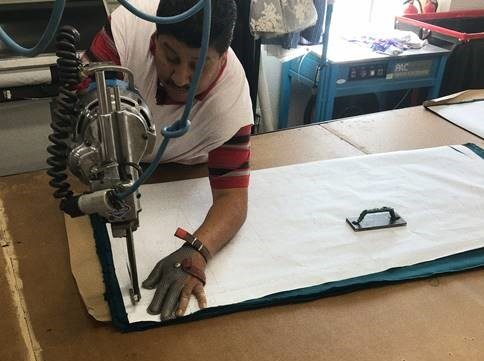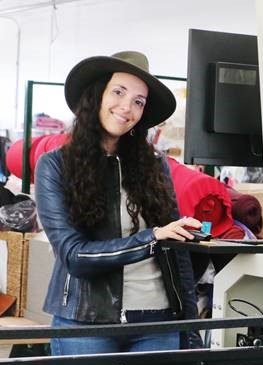
How COVID-19 changed this U.S. clothing manufacturer
How COVID-19 changed this U.S. clothing manufacturer

Like many companies, Lefty Production Co. made a big pivot in March. As stay-at-home orders went into effect, the garment and accessories production company remained essential by producing masks, gowns and other personal protective equipment.
“Marketplace” host Kai Ryssdal talked with Marta Miller, Lefty Production Co.’s co-founder and CEO, about what the pandemic has meant for companies that make clothes in America. The following is an edited transcript of their conversation.
Ryssdal: So there you are, in February, March of this year doing your thing, and then the pandemic starts rolling across the globe. What does that do to Lefty Production Co.?
“We need masks”
Miller: It was the craziest time. I mean, every time I opened my computer, it was like, “Let’s put a halt on that, you know, can I get my deposit back? We don’t want this stuff anymore.” Also, we ultimately sew. And in manufacturing, social distancing is pretty tough. And so while all these orders were canceling, I remember watching the news and New York was saying, “We need masks, we need masks.” And my husband and I started getting on the phone and trying to figure out like, all right, we can sew. So we started just beginning to create the masks.

Ryssdal: The thing is, though, you’re making stuff in LA, but you now have relocated your family to Texas. So you’re running this company remotely?
Miller: Completely. Yeah.
Ryssdal: Talk to me about the CEO challenges there, boss.
Miller: It’s funny, I am a mom of two, and I would say, [in] 2019, the largest conversation that my husband and I had was how do we get me out of the day to day? And I think every single member of my team would tell you that the company runs so much better with me a little bit distanced from it. It’s just been the biggest COVID silver lining.
Ryssdal: So let me ask you to pull back for a minute, because you’re down in the weeds of American manufacturing, and I’d love your perspective, I guess, on how you see this having changed or changing American manufacturing. Because you know, you’re a good example, right? You pivoted and now you’re doing this thing, and you’ve moved, and the company is still thriving.
Miller: You know, we’ve been seeing this need for American manufacturing to come back for a while now, mainly because retail has changed. You know, it’s easier to go overseas, when you’re producing five, ten thousand units of something. When you want to make five hundred units of something, being overseas just doesn’t really make sense anymore. With the tariffs — I mean, the dollars stop working for you. When we have Barney’s going bankrupt, when we have these big stores not placing as large of volumes and as large of inventory, then all of a sudden, the brands don’t need to place that amount of inventory with their factory anymore. And what we’re really seeing with COVID is this emergence of smaller, more unique brands, and the amazing part of social media where, you know, people love to buy a jogger from the girl that’s tie-dyeing it out of her garage.
Ryssdal: So are you seeing that? I mean, instead of getting your $50,000 order, you’re seeing the $5,000 order from this woman who wants to make a jogger or from a guy who wants to make shorts or whatever?
Engaged social media followers
Miller: Oh, my gosh, yes. And it’s not a $5,000 order. I mean, I have some clients, you know, they might have five, six or seven hundred thousand followers, but it’s not like they just have followers, they have an engaged following. Those people want to respond to inventory. They want to say, “Hey guys, vote. Do you want blue or pink?” you know, and “Everybody likes the blue. We want to go ahead and make 1,000.” So this need to not have so much inventory I think is really going to drive American manufacturing.
Ryssdal: All right, so last thing and then I’ll let you get off the phone. How much of this do you think is permanent? Because obviously, the economy is changing, we don’t know what it’s gonna be like in six months or a year. What’s your guess?
Miller: I have to say, I was a little disheartened by the hospitals to be completely honest with you. You know, at the beginning, a lot of the hospitals were like, “Oh my gosh, like, why haven’t we been doing American manufacturing? It’s so nice being able to develop something in our backyard.” And the second China came back online, that story has changed a little bit. So do I feel like, OK, all of a sudden, we’re gonna be making millions and millions of masks and gowns in America anymore? I don’t know that that’s staying, but I do feel like fashion and clothing [manufacturing] is definitely going to start making a big comeback to America.
There’s a lot happening in the world. Through it all, Marketplace is here for you.
You rely on Marketplace to break down the world’s events and tell you how it affects you in a fact-based, approachable way. We rely on your financial support to keep making that possible.
Your donation today powers the independent journalism that you rely on. For just $5/month, you can help sustain Marketplace so we can keep reporting on the things that matter to you.


















